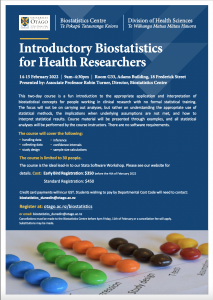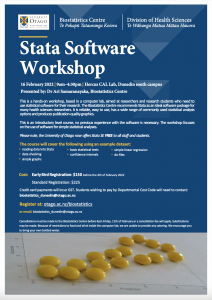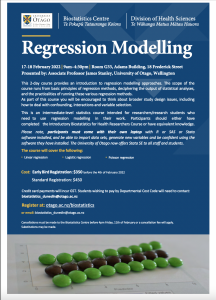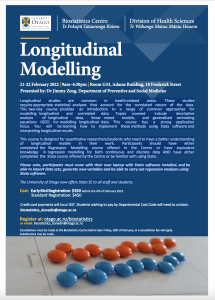Upcoming events hosted by or involving Genetics Otago will be listed here. Please check back regularly for updates. A calendar of events that may be of interest to our members can be found at the bottom of this page and in the sidebar of other pages on this site, please note that this includes events hosted outside of Genetics Otago.
Calendar of Events
The below is a calendar of events hosted by GO as well as events hosted by others that may be of interest to our members. If you have an event you would like us to include please contact us here.
| Sun | Mon | Tue | Wed | Thu | Fri | Sat |
|---|---|---|---|---|---|---|
|
Pathology Department Seminar – Prof. Greg Anderson
1:00 pm
Pathology Department Seminar – Prof. Greg Anderson
@ D'Ath Lecture Theatre
Feb 4 @ 1:00 pm – 2:00 pm
athology Department Seminar Series for 2022 begins this Friday 4th February. Our speaker will be Prof. Greg Anderson from the Centre for Neuroendocrinology & Department of Anatomy (University of Otago) who will present a seminar entitled “A neuronal circuit for[...]
|
||||||
|
Pathology Department Seminar – Karen Reader
1:00 pm
Pathology Department Seminar – Karen Reader
@ D'Ath Lecture Theatre
Feb 11 @ 1:00 pm – 2:00 pm
Our Pathology Department Seminar Series for 2022 continues as a Research Forum this Friday 11th February. The Forum will be hosted by Dr. Karen Reader- Operations Manager, Otago Micro and Nanoscale Imaging (OMNI). Karen will be presenting on “Tools for your[...]
|
||||||
|
Pathology Department Seminar: Prof. Alex McLellan
1:00 pm
Pathology Department Seminar: Prof. Alex McLellan
@ D'Ath Lecture Theatre
Feb 18 @ 1:00 pm – 2:00 pm
Prof. Alex McLellan from the Department of Microbiology and Immunology (University of Otago) will present a seminar entitled “Genetically engineered lymphocytes for the treatment of solid cancers” at our Pathology Department Seminar Series on Friday 18th February 2022. The seminar[...]
|
||||||
Subscribe





